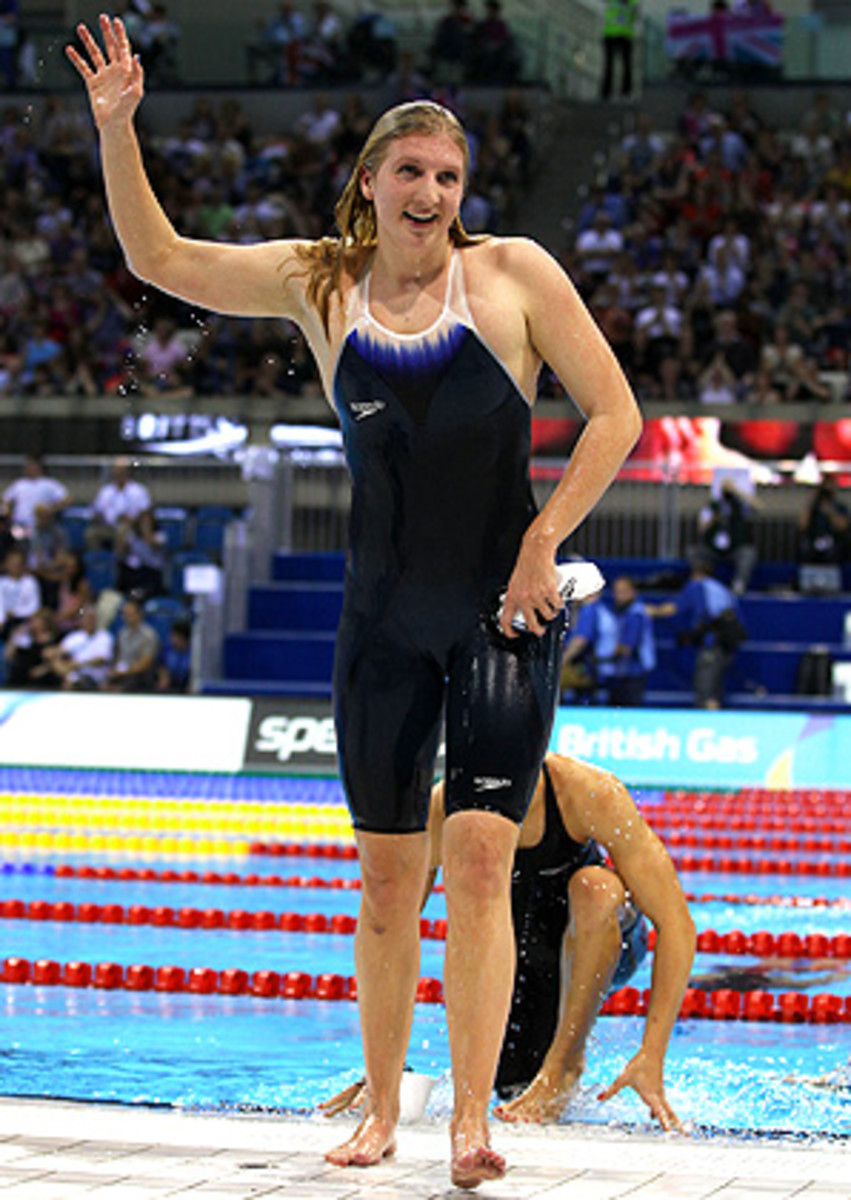British female athletes often the target of derogatory comments
Fat emerged when the coach of British heptathlon champion Jessica Ennis divulged that some unnamed national track official had pronounced her to be just that.
As for ugly, the word didn't surface verbatim. But swimmer Rebecca Adlington, winner of two gold medals at the Beijing Olympics, made clear last week that abusive messages sent to her Twitter account played some variation on that theme. As a result, she said, she'd be swearing off the microblogging service until after the London Games.
To point out that Ennis isn't fat, but actually a strikingly lapidary assemblage of ectoplasm, I'm setting out here to question precisely that kind of assessment of female athletes.
In Adlington's case, the public bile pump might have been primed four years ago on the BBC show Mock the Week, when a Scottish comedian named Frankie Boyle cracked that she resembled "someone looking at themselves in the back of a spoon." But Adlington -- blonde, fit, and only 23 -- wouldn't be the first female competitor to accustom the public to new ways of appreciating the human form, if only given a chance to excel over time. Eventually people stopped remarking on Steffi Graf's prominent nose and rhapsodized about her powerful legs.
If the Brits do anything well, it's gallantry. So of course, in the cases of Ennis and Adlington, a chorus of on-the-record voices emerged to shut down the anonymous derogatory ones. But there's no overstating the collateral damage these sorts of memes can do. Another British heptathlete, Louise Hazel, revealed that she'd been subjected to the same descriptive as Ennis and pronounced it "disgusting." Meanwhile an Olympic triathlon candidate, Holly Avil, stepped forward to say that she'd be leaving the sport at age 22 because of an eating disorder triggered by just such comments from a coach.
These kerfuffles -- coming as we celebrate the 40th anniversary of Title IX in the U.S. -- have me wondering why Britain isn't as close to full acceptance of women's sports as the U.S. It's certainly not for lack of enlightenment; Brits have led the fight against a range of other noxious sporting "isms," from shamateurism to racism. Yet a woman athlete who strays from the female ideal is still good for a cheap laugh.
A musical based on Roald Dahl's Matilda is the hit of the West End, and it stars an over-the-top Miss Trunchbull, a former British Olympic hammer-throwing champion who (played by Bertie Carvel, an actor of the XY chromosomal persuasion) is certifiably fat and ugly, as well as irredeemably hateful -- and when I went last week everyone in the theatre howled at the caricature.
The real problem, I suspect, lies elsewhere. Ennis and Adlington -- and a succession of female British athletes going back to javelin thrower Fatima Whitbread and tennis star Virginia Wade -- have tended to practice their sports both in isolation and in very little clothing. This invites leering evaluation, through no fault of the athletes' own. What Britain needs is a team of women to rally around, in the same way Americans could throw themselves behind gold-medalist softball, soccer and basketball teams during the Atlanta Games.
The Brits may just get their chance this summer. For the first time at an Olympics, "England" will yield to a "Team GB" in women's soccer, able to choose players from Wales, Scotland, Northern Ireland and England for a single squad. Alone, England reached the quarterfinals of the 2011 Women's World Cup; a deeper team, playing at home, is poised to make an even more impressive showing, and public attitudes could pivot accordingly.
In the meantime, if you want a fat Englishwoman, I give you 880-pound Georgia Davis. On May 24, just as l'affaire Ennis was percolating in the news, a team of engineers and medics had to first partially dismantle Davis' South Wales home, then winch her free, to deliver her to the hospital for treatment, in a nine-hour effort that cost more than $150,000.
As for ugly, ugly is as ugly does. Brits will tell you they love their football; yet a week ago, just as the Women's FA Cup final between Birmingham City and Chelsea went to penalty kicks, SkySports 2 cut away from its coverage to go to the warmup of a men's match between two second-level club teams. (This would be the same SkySports that, 15 months ago, featured two male broadcasters who guffawed their way through women's highlights and mocked a female referee. Neither has worked for the network since January 2011, when video emerged of one inviting a female co-presenter to string a microphone cord down his pants as the other giggled his approval.)
It's time for the adoption of a universal rule: If a match goes to pennos, whether it's between teams of men, or women, or hermaphrodites, you don't cut away. It's more than a matter of respect for women. Anything else would be ugly treatment of the beautiful game.





